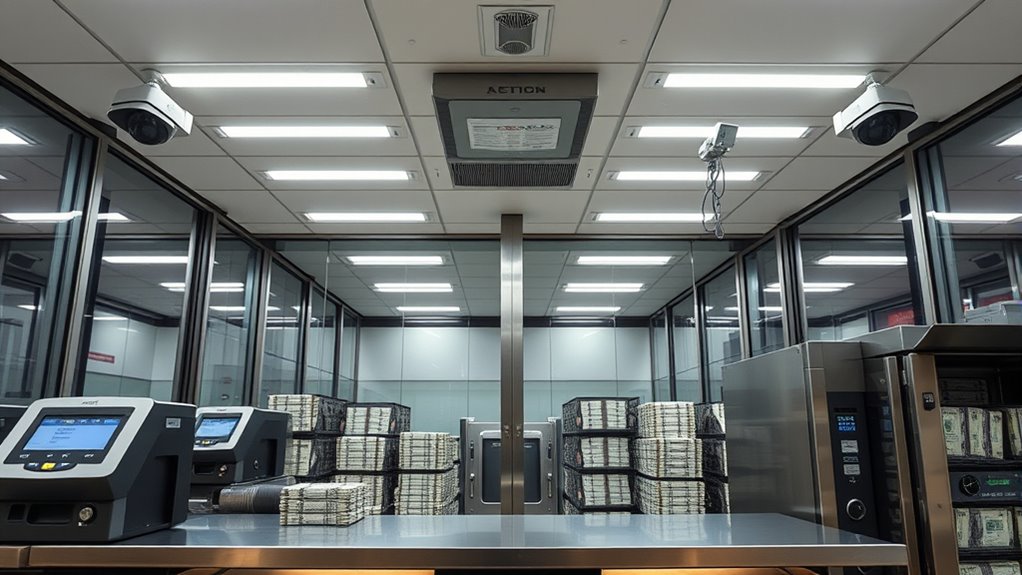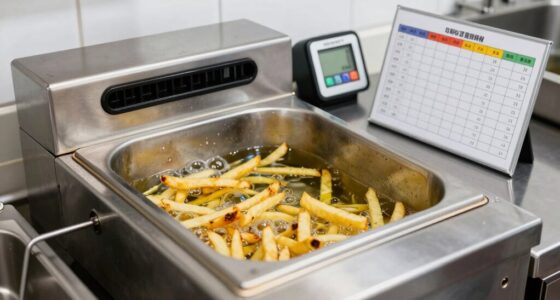Implementing strong security and cash handling policies involves limiting physical access to trusted employees, using unique login credentials and biometric authentication, and maintaining strict key controls. Regular cash reconciliation, ideally with two staff members, helps identify discrepancies quickly. Installing surveillance cameras and using automated cash counting machines can deter theft and reduce errors. Keeping detailed logs of transactions, access, and reconciliation activities fosters transparency and accountability. Continuing will help you master these strategies for safer, more accurate cash management.
Key Takeaways
- Implement strict access controls, including unique credentials and biometric authentication, to limit cash handling to trusted personnel.
- Conduct regular cash reconciliations with documentation of discrepancies for accountability and prompt resolution.
- Utilize surveillance cameras and automated cash counting machines to monitor and reduce errors during cash handling.
- Maintain detailed records of transactions, access logs, and reconciliation activities to ensure transparency and audit readiness.
- Foster a culture of accountability by enforcing policies, training staff, and reviewing procedures regularly to prevent theft and fraud.

Effective security and cash handling policies are essential for safeguarding your business’s assets and ensuring smooth operations. When it comes to managing cash, implementing strict procedures around access control is vital. You want to limit who can physically handle cash, access safes, or operate cash registers. By establishing clear access control protocols, you reduce the risk of internal theft and unauthorized transactions. This might include assigning unique login credentials, using biometric authentication, or maintaining strict key control for safes and cash drawers. Regularly reviewing and updating these access permissions guarantees that only trusted staff members have the ability to handle cash, making it easier to track any discrepancies or suspicious activity.
Cash reconciliation forms the backbone of accurate cash handling. It involves comparing the cash in your registers or safes with recorded sales and transactions to identify any discrepancies immediately. You should perform cash reconciliation at regular intervals—ideally at the end of each shift or business day—so issues don’t pile up. When you reconcile cash, double-check receipts against physical cash, and document any differences thoroughly. This process helps catch errors early, whether they stem from simple mistakes or potential theft. Training your staff on proper reconciliation procedures guarantees consistency and accountability across your team. It’s also a good idea to have two people involved in reconciliation processes periodically, which adds another layer of oversight and reduces the chance of errors or misconduct.
In addition to physical controls, leveraging technology can greatly improve your cash handling practices. Automated cash counting machines reduce human error during reconciliation, while surveillance cameras keep an eye on transactions and cash handling areas. Combining access control and cash reconciliation with these technological tools creates a thorough security system that deters theft, fraud, and mistakes. Remember, transparency and documentation are key; keeping detailed records of cash movements, access logs, and reconciliation reports makes it easier to identify issues quickly and provides an audit trail if needed. Studies show that businesses implementing cash handling strategies experience fewer discrepancies and losses, emphasizing the importance of structured procedures.
Ultimately, your goal is to create a controlled environment where cash flows securely and accurately. Enforcing strict access control measures limits opportunities for theft, while diligent cash reconciliation ensures that all funds are accounted for and discrepancies are addressed promptly. When these policies are consistently applied, they not only protect your assets but also foster a culture of accountability and professionalism within your team. Properly managing access and reconciling cash regularly establish a solid foundation for your business’s financial integrity and long-term success.
Frequently Asked Questions
How Often Should Cash Handling Procedures Be Reviewed?
You should review your cash handling procedures at least quarterly to guarantee they stay effective. Regular reviews help identify gaps and adapt to any changes in your business or industry regulations. Keep in mind that audit frequency can influence how often you update policies—more frequent audits may require more frequent reviews. Staying proactive with policy updates ensures your procedures remain secure and compliant, reducing risks and safeguarding your assets.
What Training Is Provided for New Security Protocols?
You’ll receive extensive training on new security protocols, ensuring you understand the latest procedures. Did you know that organizations with regular security awareness training see a 70% reduction in security incidents? This training covers everything from protocol implementation to recognizing potential threats. You’ll participate in hands-on sessions and ongoing updates, helping you stay confident and prepared to handle security situations effectively.
How Are Cash Discrepancies Investigated and Resolved?
When you find cash discrepancies, you should follow audit procedures and complete discrepancy reports promptly. Investigate the issue by reviewing cash registers, transaction records, and security footage if available. Report your findings to management, and collaborate to resolve the discrepancy. Proper documentation helps prevent future issues, ensuring accuracy and accountability. Your thorough investigation and clear communication are key to resolving discrepancies efficiently and maintaining trust in the cash handling process.
What Are the Consequences of Policy Violations?
Did you know that 65% of companies face significant financial losses due to policy violations? When you violate policies, you face consequences like employee discipline and increased scrutiny during audit procedures. These measures guarantee accountability and protect assets. Violations can lead to warnings, suspension, or termination, emphasizing the importance of adhering to policies to maintain trust and prevent costly repercussions. Stay compliant to avoid these serious consequences.
How Is Employee Access to Cash Controlled?
You control employee access to cash through strict access controls, ensuring only authorized personnel handle money. You also implement audit trails, which record every transaction and access point, helping you monitor and verify cash handling activities. By regularly reviewing these records, you can detect any discrepancies or unauthorized access, maintaining accountability and security. This combined approach minimizes risks and keeps cash handling transparent and secure within your organization.
Conclusion
By following these security and cash handling policies, you become the guardian of your business’s treasure chest. Think of each rule as a sturdy lock on a vault, protecting your hard-earned money from slipping through the cracks. When you stay vigilant and disciplined, you’re weaving a safety net that catches potential risks before they land. Remember, your careful actions are the lighthouse guiding your business safely through any storm, shining bright against the darkness of theft and loss.









